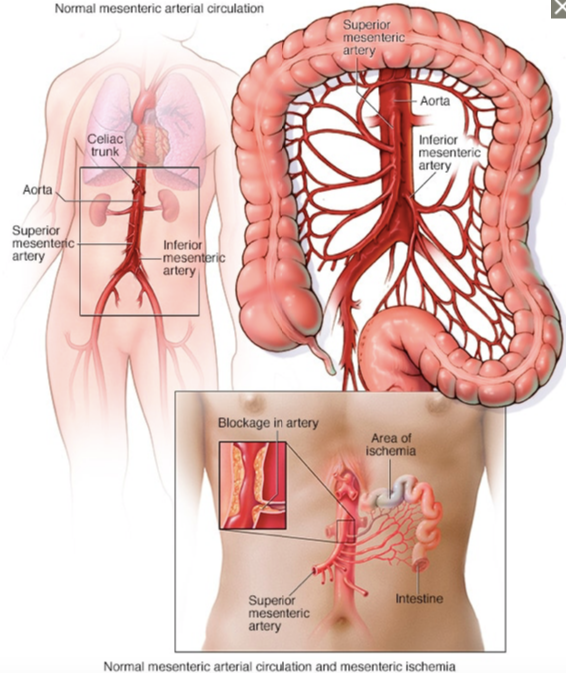MESENTERIC ISCHEMIA
By: Zuyuan (Milly) Huang, MSIV and Bryan Kramer, MD
Photo of Mesenteric Ischemia obtained from The Mayo Clinic
What is Mesenteric Ischemia (Ischemic Bowel Disease)?
Mesenteric arteries supply blood to your small and large intestines. Ischemia is when the blood flow is restricted or reduced to a part of the body. In mesenteric ischemia, the intestines do not get enough blood (and thus, oxygen) to function and can die. This condition is most commonly seen in those older than age 60 with risk factors include smoking, vascular disease, and atrial fibrillation.
What are the symptoms of Mesenteric Ischemia?
This condition can be acute (abrupt start of symptoms) or chronic (had the condition for a long time).
Acute symptoms:
Most common causes include:
The goal is to re-open the artery to allow adequate blood flow to reach the intestines. Treatment depends on whether the condition is acute vs. chronic, what is blocking the blood vessels and what type of vessel is blocked (i.e., artery which brings blood to the
bowel, or vein which drains blood from the bowel)
Surgical Treatments include:
Go Back What is Mesenteric Ischemia (Ischemic Bowel Disease)?
Mesenteric arteries supply blood to your small and large intestines. Ischemia is when the blood flow is restricted or reduced to a part of the body. In mesenteric ischemia, the intestines do not get enough blood (and thus, oxygen) to function and can die. This condition is most commonly seen in those older than age 60 with risk factors include smoking, vascular disease, and atrial fibrillation.
What are the symptoms of Mesenteric Ischemia?
This condition can be acute (abrupt start of symptoms) or chronic (had the condition for a long time).
Acute symptoms:
- Sudden, severe mid to upper abdominal pain typically after eating- SICK!
- Nausea, vomiting, sudden bloody diarrhea
- Since this condition is serious and can worsen quickly (mortality rate exceeding 60%), it is critical to go to an emergency room to seek medical attention immediately.
- Severe pain in mid to upper abdomen starting about an hour after eating, lasting about two hours before disappearing. Big meals make the pain worse.
- Unintentional weight loss
- ALL patients with chronic mesenteric ischemia are THIN and getting thinner
- Food aversion due to pain; feeling full too quickly when eating.
Most common causes include:
- Blood clot, called an embolus, travels to mesenteric arteries obstructing blood flow. These clots usually originate in the heart in patients with atrial fibrillation (irregular heart beat), or other heart disease (i.e., valvular)- ACUTE
- Atherosclerosis due to plaque buildup, which causes arteries to become narrow and stiff, and thus slowing blood flow through them. Atherosclerosis is caused by many chronic conditions such as high cholesterol, high blood pressure, smoking, obesity, diabetes and inflammatory conditions- CHRONIC
- Nonocclusive mesenteric ischemia due to low-flow state (i.e., low blood pressure from Congestive Heart Failure, aortic dissection) or bowel strangulation from hernias, volvulus, etc.- IN THE CRITICALLY ILL, ICU PATIENT
- History (medical history, social history such as smoking, etc.) and physical exam performed by physician.
- Blood tests
- CT Angiogram (gold standard): X-rays are used to assess body’s blood vessels. A dye called contrast is injected through an IV in your arm.
- Doppler ultrasound: uses high-frequency sound waves to see which specific arteries are blocked. Accuracy limited by bowel gas.
The goal is to re-open the artery to allow adequate blood flow to reach the intestines. Treatment depends on whether the condition is acute vs. chronic, what is blocking the blood vessels and what type of vessel is blocked (i.e., artery which brings blood to the
bowel, or vein which drains blood from the bowel)
Surgical Treatments include:
- Angioplasty (small balloon) and stenting of the narrowed artery
- Bypass surgery: to create a detour around the blocked vessel using one of your veins or a synthetic tube
- Endarterectomy: operation to remove plaque in the mesenteric artery
- Embolectomy- operation to remove acute embolus blocking artery
- Thrombolytic agents can be used if the condition is acute to dissolve the clot
- If a part of your intestine has died due to blood flow, these damaged portions may need to be removed
- Anticoagulants (“blood thinners”)
- Antibiotics to treat infection
